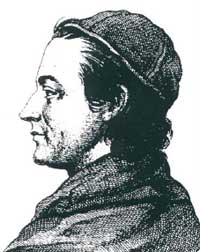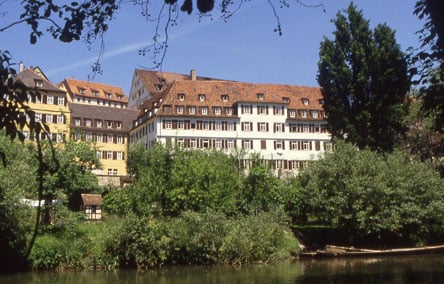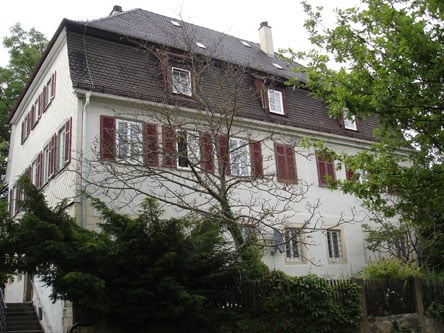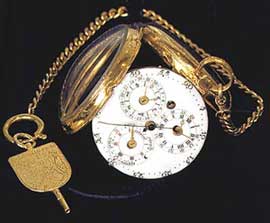
Philipp Matthaus Hahn
Already in his lifetime, the German vicar Philipp Matthäus Hahn was known in church circles through his theological writings, with princes and nobles by his large astronomical clocks and machines, and the upper middle class through his pocket watches, scales, and calculating machine (see calculating machine of Hahn).
Philipp Matthäus Hahn was born on 25 November 1739, in Scharnhausen auf den Fildern (near Stuttgart), as the second of eight children (Philipp had an elder sister, Juliane Felicitas, b. 18.2.1737) in the family of the pastor Georg Gottfried Hahn (b. 18.10.1705 Untersielmingen, d. 25.5.1766 Ostdorf) and Juliana Kunigunde Justine Hahn, nee Kaufmann (b. 18.5.1711 Maichingen, d. 26.2.1752 Scharnhausen), who married on 8 May, 1736.
Hahns was a rather prominent and wealthy local family, known to live in Scharnhausen since 16th century. Philipp Matthäus got his name after his grandfathers—Johann Philipp Kaufmann (1661-1748), a pastor from Stuttgart, and Matthäus Hahn (1670-1759), a merchant from Sielmingen auf den Fildern. Juliana Hahn died in February 1752, and in November 1852, Georg Hahn married a second time to Charlotte Dorothea Maichel (b. 6.2.1733 Tübingen, d. 7.5.1780 Stuttgart), and the new family had five more children.
As a little boy, Philipp was taught by his father and his maternal grandfather four years of ancient languages and religion (Latin, Greek, and Hebrew). Being only 8 y.o. he became interested in astronomical observations and found in his father’s library a book with a description of the celestial sphere, which delighted him for a long time. Two years later, Philipp constructed a simple sundial.
From 1749 to 1754 Philipp attended Latin schools in Esslingen and in Nürtingen, studying religion, but also painting and especially mathematics. During this time he kept his interest in astronomical observations and sundials and was promoted by Tobias Mayer, the future director of the Göttingen Observatory. In May 1756, the Hahn family moved to Onstmettingen, in the Swabian Jura (in 1755 Georg Hahn was transferred for disciplinary reasons by the consistory there for drunkenness). There Philipp met his future assistant Philipp Gottfried Schaudt (1739-1809), who had learned the art of watch-making with local craftsmen. This meeting marked the beginning of a lifelong friendship and successful cooperation between the two because Hahn used Schaudt’s technical skills to implement his ideas into practice.

On October 22, 1756, Hahn enrolled in the Protestant theological seminary Tübinger Stift in Tübingen to study theology, and there continued his occasions with clocks. (It is amazing, that some 150 years before Hahn, in the same college studied also theology the inventor of the first mechanical calculating machine—Wilhelm Schickard, however Hahn, in contrast to Schickard, later on, rejected the proposed to him professorship here.)
Hahn had a hard time in Tübingen because his father couldn’t support his children through university. In 1758 Philipp managed to get a two-year grant from the Widerholt’s family foundation and also got some money from his stepmother. In the same 1758 he (for the first time) also had been paid out for his technical knowledge and his mechanical skill — during the semester break, he got thirty guilders to make a sundial for a church. Together with his friend Schaudt, Hahn made not only sundials but also mouthpieces and grind lenses for telescopes.
In 1760 Hahn obtained a Master’s degree in Philosophy in Tübingen, then worked some time (a year) as a private teacher. At that time Hahn worked on the construction of a Perpetuum Mobile, but soon he realized it was impossible to build such a machine.
In 1761 Hahn started his way in Church as a Vicar in Lorch bei Schwäbisch Gmünd, then in Herrenberg, to receive in 1764 a Vicariate in Onstmettingen, succeeding his father, who had died suddenly. There he (together with his old friend and schoolmate Schaudt) organized a workshop for the construction of scales, astronomical clocks, and machines to the glory of God. In 1767 he made a big brass and iron astronomical clock, presented to Duke Karl Eugen, the Herzog of Württemberg, who admired the inventor and promptly ordered a larger machine for the Library of Ludwigsburg.
On 24 May 1764, Philipp Hahn married to 15 y.o. Anna Maria Rapp (1749-1775), a daughter of the mayor of Schorndorf Ulrich Rapp. The family had 6 sons, 2 of them died as babies, so left 4 — Christoph Matthäus (1767-1833), Christian Gottfried (1769-1831), Gottlieb Friedrich (1771-1802), and Immanuel (1773-1833). All the sons shared Hahn’s interests in mechanics and mathematics, and two of them — Christof Matthäus and Christian Gottfried also became skillful watchmakers.
In Onstmettingen Hahn constructed many solar, steeple, pocket, and pendant watches. In 1769 he turned to the construction of scales and started the construction of a big astronomical machine (it was a giant astronomical clock, called “Weltmaschine”, which became the primary inspiration for the creation of his calculating machines), which was admired by Herzog Carl Eugen von Württemberg, who became his patron and who used to dub Hahn as “the watchmaker God”.

In 1770 Duke Karl Eugen proposed a mathematics professorship at Tübingen to Hahn, but he refused it. In the same 1770 however Hahn accepted another position, arranged by the Duke, and in March moved to serve in the well-paid parish Kornwestheim, where he lived in the new rectory (see the upper photo) and arranged a large workshop, where he invited to work his brothers—Georg David Polykarp (1747-1814) and Ägidius Stephanus Gottfried (1749-1827). There unfortunately his wife Anna died too young, on 10 July, 1775, giving birth to their seventh child. In 1776 Hahn married a second time to Beate Regine Flattich (1757-1824), a daughter of the Münchinger parson Johann Friedrich Flattich (1713-1797). The new family had 8 children.
In 1781 Duke Karl Eugen again arranged a new very well-paid position for Hahn, in the parish of Echterdingen, near Stuttgart. In Echterdingen Hahn dealt mainly with pocket watches and even wrote a treatise in this regard.

In 1772-1774 Hahn published several theological books: The main cause of the Apocalypse (1772), Clue to the understanding of the Kingdom of God (1774), and two sermon books. The printing of books he financed from the profits, dropped from the workshop. Hahn published also several technical books: Beschreibung mechanischer Kunstwerke in 1774, Von Verbesserung der Taschenuhren in 1784.
In June 1779 Hahn was appointed as a member of Erfurt Academy of Sciences. This remarkable man died of pneumonia on 2 May 1790, in Echterdingen. He was buried in Kirchfriedhof von Echterdingen.
After the death of Hahn, several calculating machines by his design were created by his apprentices—his oldest son, the clockmaker Christoph Matthäus Hahn (15 April 1767–1 June 1833), his brother-in-law—Johann Christoph Schuster (1759-1823), his friend Philip Gottfried Schaudt, Jacob Auch (1765-1842), and brothers Sauter from Esslingen.
The image featured at the top of this post is ©Unknown author / public domain
